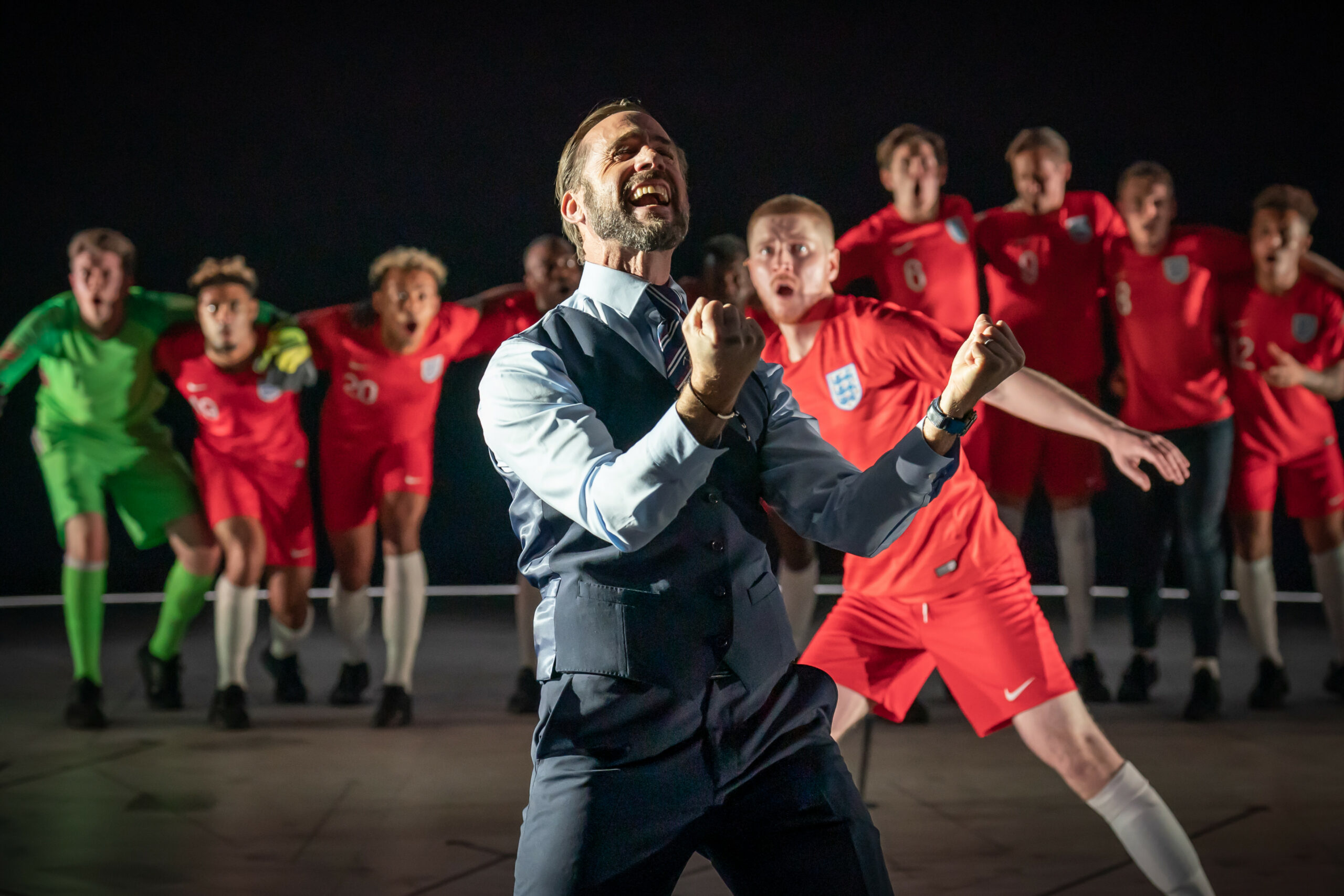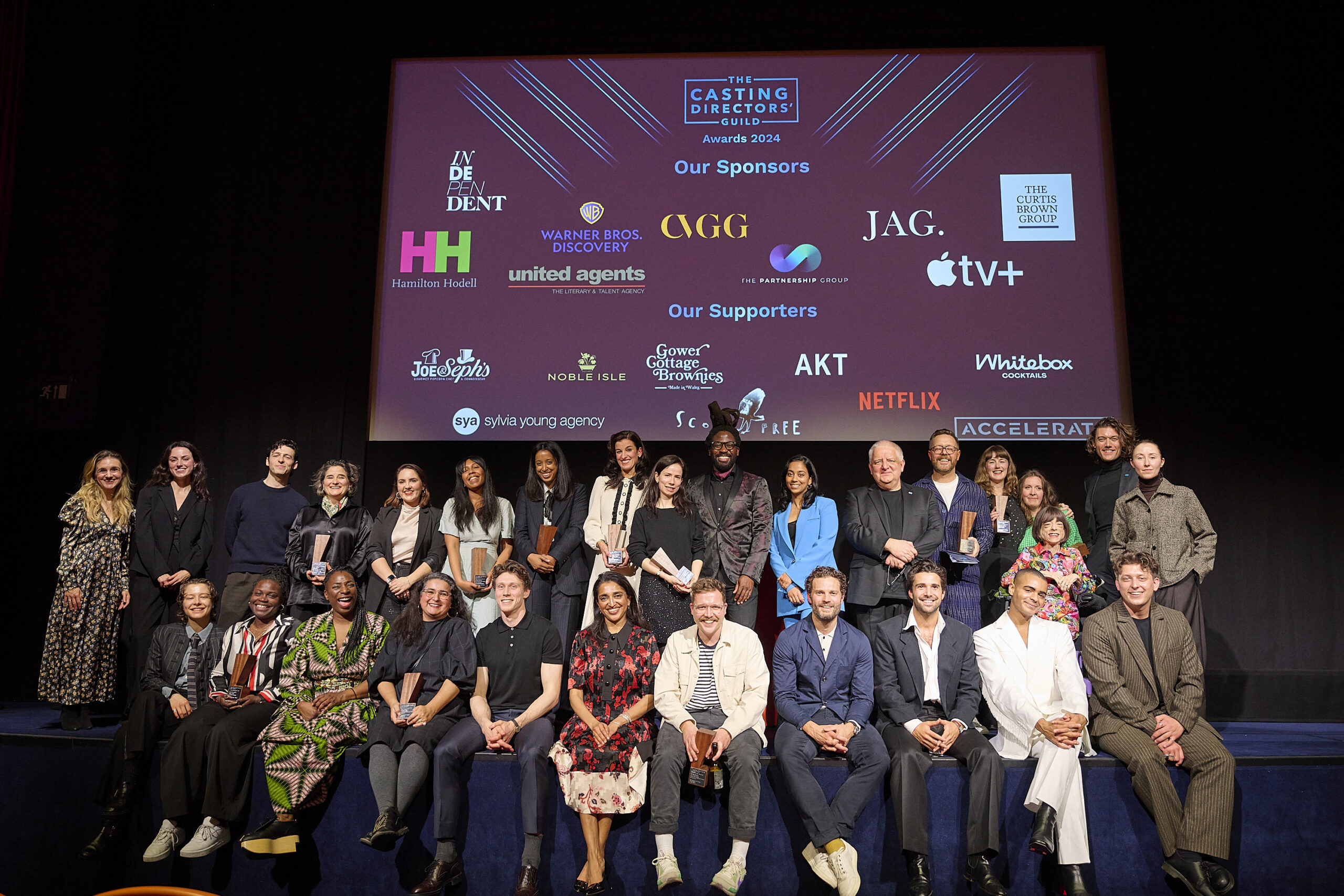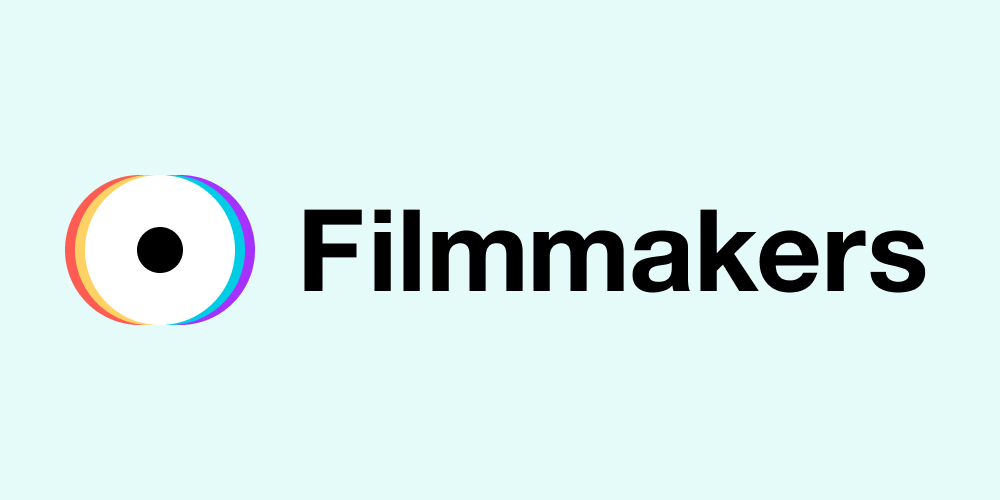Actor Lewis Shepherd talks to us about how he won the role of Dele Alli in the National Theatre’s triumphant play ‘Dear England’
Lewis Shepherd is a familiar name here at Spotlight. As a graduate, he took part in the Spotlight Prize in 2022, representing Rose Bruford College and delivering two stunning monologues, including one he penned himself. Since then, we’ve seen him appear on stage at Soho Theatre, The Vaults and in the quirky music video for Mae Stephen’s pop song, If We Ever Broke Up.
A year on from his Spotlight Prize showcase, we caught up with Lewis to find out more about his role in Dear England at the National Theatre, where he plays ‘Dele Alli’ alongside two other Spotlight Prize finalists: Darragh Hand and Bill Caple.
Hi Lewis. We last spoke to you at the 2022 Spotlight Prize. How have things changed for you since then?
“Working has been the main thing. I’d done all my projects and my dissertation [and] when Spotlight [Prize] ended, as soon as they announced the winners, I literally had this weight lift off my shoulders of being like, ‘Oh my God, I’m done.’
Obviously, it was an amazing opportunity, but it was super overwhelming at the same time. And then, the day after, I got my first job.”
Last year, we asked you what you wanted to be doing in a year’s time, and you said, “I want to be working on stage and screen as much as possible.” Can you tell us about some of the work you’ve done since?
“Straight out of school, I did Super High Resolution at the Soho Theatre, which was a play about a doctor. Her life was falling apart around her and the pressure that came with being a doctor in the NHS. That was amazing. My mum and most of my family work in healthcare, so it felt personal and important. It felt like, this is a play for my mum.
Then I did an indie film directed by Fenella Greenfield called 10 Swords & the Moon. That was a smaller role, quite an odd character, but it was fun to play. That’s due to come out soon.
And then I went to The Vaults for four nights [to do a show] called I Fucked You In My Spaceship. It’s a queer play by Louis Emmitt-Stern. The title always makes people laugh. James Graham, the writer of Dear England saw it, and when I came to audition for that, he was like, ‘Oh, I saw you in I Fucked You in My Spaceship.’
So, I did The Vaults, then a couple of little things like a music video [If We Ever Broke Up by Mae Stephens]. It was a really fun day and everyone was really lovely. It was very different to anything I’d done. They put me in this harness for 40 minutes. I was up about 15-20 feet in the air. I had this harness on. It was really uncomfortable. And then I was having to scream and scream. The harness was stopping the blood from going to my legs, and I was getting too much blood going to my head. So, then I come down onto the ground and the paramedic’s like, ‘You okay?’ And I’d be like, ‘Yeah, yeah, I’m fine.’ He’d be like, ‘You sure?’ I’d be like, ‘I do feel a bit weird.’
He said it’s hypoxia or something like that. So, we did all this filming, I was screaming, and it’s three seconds in the video! So little of it is actually seen.”
Everything you’ve worked on has been quite varied. Has that been intentional?
“I’ve just been lucky that the things I have worked on have been varied. I’m not at the point [in my career] yet where I can just pick and choose. They’ve been varied projects, but character-wise, there’s always a common thread, which is maybe what I’m bringing to it.
[The roles] tend to be people with secrets […] a toxic boyfriend or someone that’s hiding something.”
You’re currently playing Dele Alli in ‘Dear England’ at the National Theatre. Can you tell us how you got the role?
“I’d actually got to a point where because I’d been at school then working and working, I was like, ‘I really need to have a break.’ [Then] I got this email through [from my agent] that was an audition at the National Theatre. I just went, ‘That’s pretty cool. I kind of have to do that one,’ or at least go to the audition and hope for the best.
I went to an audition and I had all these things in my head. I was like, ‘If they ask me what I think about the play, I’m going to say this.’ I actually went in, had a bit of a chat, James said he’d seen I Fucked You In My Spaceship, I did the audition, that was about it. I walked out and then Chloe, one of the casting directors, was like, ‘How was it?’ and I was like, ‘I’ve actually got no clue how that has gone.’
And then I got a recall. It was with Hannes [Langolf], one of the movement directors. It was an hour long and it was really good fun. It was like a free workshop really. I’d given it everything and I really tried in every audition. I really threw myself at it and did things that would be out of my comfort zone.
I had a job already that I’d been offered, and then I had another job as I Fucked You In My Spaceship was transferring to the Soho Theatre. Then my agent called me the same day and was like, ‘You’ve got the job!’”

Lewis Shepherd as Dele Alli in ‘Dear England’
What was it like working with a movement director in rehearsals?
“It was so full on! On the first day, Ellen [Kane], one of the movement directors, said, ‘Okay guys, do you prefer working in beats or counts?’ And I was like, ‘I don’t know what that means.’ Hannes was like, ‘It’s fine, don’t worry, you’ll pick it up.’
It was really fun, but it was so intense. If you’re a dancer, it’s probably not that intense, but we’re not dancers. So, it was 10am – 6pm every day and it was unrelenting. [With] any of the movement sequences, there’s probably five to 10 variations of each. For me, it was more mentally than physically draining.
They were brilliant and really patient. They knew when to push us and how to push us, which is such credit to their skill as directors because there were times when you could see all of us were just zombified.”
That must have been quite the bonding experience with the rest of the cast.
“Yeah, we’re good mates now, which is really nice. Literally the other day, someone was like, ‘Isn’t it weird we’ve known each other three months?’ And Will Fletcher was like, ‘Three months? It feels like a f**king lifetime.’”
And there are a couple of other Spotlight Prize finalists in the play as well – Darragh Hand and Bill Caple…
“Bill was the same year as me. So, I knew Bill and he joined halfway through the rehearsal process. It’s been wicked to see him again and work with him.
Me and Darragh get on really well. I’ve had my hair cut now, but we both had blonde tops, are mixed race and probably have a lot of the same auditions. We were saying, ‘We’re either going to hate each other or love each other.’
Thankfully we love each other. They’re both super-talented and easy to work with, so it’s been wicked.”
The play deals with themes of masculinity and mental health. How did you approach that as an actor?
“I’m very comfortable with my masculinity, and so I never find it too challenging to approach in a role. It’s easier to put up the front of masculinity than it is to try and strip it away. So, when you have these players who are coming to the pinnacle of their career, their ego is heightened and they’re men in a male-dominated sport and industry, it would be easier to go to that than it would be to try and bring it away and be more sensitive. The first thing I noticed when reading the play was how it tackles that.
It’s always really interesting to talk about in a rehearsal space, especially when it’s groups of men and you never know how people feel towards things. I don’t think any of us would’ve been cast in the roles if we didn’t have the capability to approach the subject with some sort of grace or the ability to not have those shields up ourselves. Because it’s about hope and breaking down the barriers and gelling, talking about your feelings and that it’s okay to talk about your feelings, and that doesn’t make you any more or less of a man. How you identify your gender is irrelevant to that.”
How have you maintained your physical and mental stamina throughout the whole process?
“I take a lot of naps. Sleep’s a massive thing for me personally. Trying to eat healthily. When I do theatre, it sort of consumes my life, which is something that I need to get better at. It’s hard to see friends because when you’re in rehearsals, you can’t turn up tired or hungover or whatever. Then your evenings are busy with the show and when your friends tend to be working, you’re just sleeping.
I live with a couple of my friends, which makes it easier because you need a support network. You need someone to chat to and my girlfriend’s great, she lives in Cardiff, so it’s a lot of phone calls.”
How has it felt to portray a real person?
“It’s actually been an interesting journey because I was so committed to playing Dele Alli and doing as much research as I can. Obviously, I can’t ever mimic, that’s not even my job, to mimic Dele Alli and because I’m on the Olivier stage, I can’t speak like him because you wouldn’t hear anything and it wouldn’t be engaging dramatically. It’s finding a way to meet in the middle as you would with any character.
I found it weird because he’s only a few years older than me, he’s still alive and very present in what you see. It felt odd when that interview about Dele Alli’s personal life came out and knowing someone had a very upsetting upbringing and, as an actor, being like, ‘That’s stuff I want to work with,’ felt very shallow.
For me to view it as work felt odd, but I want to do it justice and I want to portray him the best that I can. So now it’s more knowing that you’re playing a version of Dele Alli rather than playing Dele Alli, because there’s only one.”
Did you approach this role differently than you would a fictional character?
“Yes. I was trained in Meisner, and so it’s crafting-based. You can make up the backstory of the character as much as you want, then when you come to rehearsal, your job is to fit that into the world and the relationships with the other actors and the director and all that stuff. Crafting imaginary things and secrets that inform decisions, etc.
Whereas with this role, I could just take what I could find in terms of crafting. It was a lot of watching interviews and videos and looking for quotes that people had said about him and things that he’d said. Then, obviously, there’s the text, but there isn’t heaps that is said about the players or about each other, so it’s trying to get that information from the internet instead.”
Have you noticed that the audience has been different for this show than anything else you’d been in?
“Yeah. It’s so nice. I want to make theatre the way it’s portrayed in the 17th century, with people shouting, alive and as a visceral experience. There are obviously shows where you need to be silent and just watch. But when I’m watching, I’m very vocal and I’m not afraid to laugh. This show really has welcomed in all backgrounds, ages, classes, because it’s football and it’s an accessible language and a story for everyone. There’s blokes and kids in there with England football shirts on and it’s nice to see people stood up clapping at the end and they’re just beaming. You can see they’ve not gone to the theatre before, or maybe they haven’t been to theatre in a while, but they’re just so happy to have seen the play.
We had a dementia-friendly show the other day, and there was really nice feedback from that. The [theatre] just adjusted the lights and the sound, and the house lights stayed up a bit, and people could enter and exit as they pleased. Someone said they can’t go to football matches anymore and they didn’t really go to the theatre and so this was perfect for them to be able to do that. It’s been so rewarding.
Theatre and art should be for everyone, and I feel that the hyper-intellectualisation of art, and in my opinion, the ego of directors or writers or whatever has driven audiences out of theatres. It doesn’t make any sense to me, what’s the point? It’s meant to be a community thing where anyone can go, watch a show, and have fun. That’s what’s so rewarding about being part of [Dear England]. Knowing there are kids that will see that show and maybe they’ll want to go into theatre or writing or directing or the arts in some way, which is what happened to me. I saw my first play in the Olivier and then was like, “I want to do whatever this is.” And so that might happen for loads of kids that have come to see this, and I think it’s super important. It’s been really nice to have those new audiences.”
Have any of the England team been to see the play?
“No. None of the players have been. We’ve had some of the older players come in, like Ian Wright, Gary Lineker and Tony Adams and a couple of others, but none of the present players.”
What’s next for you once the run is finished?
“A break! I’m going to go home to sit by the seaside and relax for a week or so. Maybe a little holiday and then just sort of figure out from there, really. I’ll keep auditioning and playing my cards right.”












